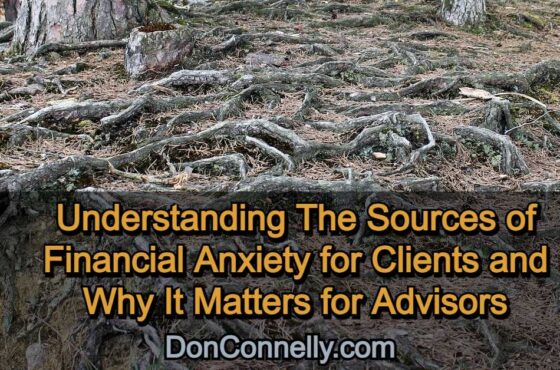5 Reasons Advisors Need a Well-Conceived, Systematic Communications Strategy
 Financial advisors are reaching a pivotal moment that will shape their future. An increasingly competitive landscape, fee compression, the commoditization of advice, and increasing client expectations make client satisfaction, retention, and referrals more essential than ever. As advisors struggle to differentiate themselves in a sea of sameness, I always reach back to the time-tested solution: good communication.
Financial advisors are reaching a pivotal moment that will shape their future. An increasingly competitive landscape, fee compression, the commoditization of advice, and increasing client expectations make client satisfaction, retention, and referrals more essential than ever. As advisors struggle to differentiate themselves in a sea of sameness, I always reach back to the time-tested solution: good communication.
If you have been following my blog for a while, you’re familiar with my core belief that communication is vital to developing solid and enduring relationships. You simply can’t form trusted relationships without good communication.
Most clients don’t feel engaged with their Advisor
Don’t take my word for it. Take your clients’ word for it. A study by YCharts on advisor communications answers one critical question: How important is regular communications to clients?
Of the dozen or more factors clients consider the most important when selecting a financial advisor, Customer service/communication was ranked second, just ahead of “Portfolio performance.” The first factor was a “Deep understanding of me and my goals,” which I consider a critical component of good communications.
I recommend every advisor thoroughly digest the YChart study because my major takeaway is that many clients feel they’re not getting the communication they need while making it very clear that it’s what they value the most in an advisory relationship.
The bottom line of the study is advisors with any hope of acquiring and retaining clients must have a well-conceived, systematic process for communicating with their clients and prospects on several different levels. By doing so, the results can be transformative for your business.
Frequent communication builds and solidifies trust
Trust is vital to the advisory relationship, without which there is no basis to continue the relationship. And trust requires communication. More than half the clients in the survey lamented that they are contacted either infrequently or very infrequently. The problem is that infrequent communication can hollow out relationships leading to a lack of trust.
Clients get the personal experience they desire
The study also revealed that, more than anything else, people want a personal experience. Why? They get it everywhere else, so it’s the least they should expect from their financial advisor. The days of repackaged newsletters and generic emails are gone. Personalization is going to be even more vital in trying to attract the younger generations, with four out of five younger clients saying it’s what they expect from their financial advisor.
With content or marketing automation software embedded in your communications system, you can create the personal touch with the click of a mouse.
Clients will have confidence in your financial advice
Do you ever get frustrated when your clients question or don’t follow your financial advice? More frequent communications can solve for that. Even if just an additional meeting, call, or email, two-thirds of clients surveyed said more frequent contact would give them more confidence in their financial advisor.
Clients more likely to stay with advisor who frequently communicates
In the survey, clients were asked if they would factor in the frequency and style of communications in deciding whether to stay with their advisor. Let that sink in. If your clients are assessing the quality of communications during good markets, what must they think when the markets go south?
Clients are more likely to recommend their advisor to family and friends
The same question was asked regarding clients’ willingness to recommend their advisor to their friends and family. An astonishing nine out of 10 said they would factor the quantity and quality of communications with their advisor in that decision. Advisors who communicate more frequently with their clients have more opportunities to keep them fully apprised of the value they’re receiving, making them more willing to vouch for the Advisor’s services.
These outcomes can be transformative to your business. But they are also essential for your survival. The most important investment you can make right now is in a well-conceived and systematic communications strategy, so no client feels left behind. In our next post, we’ll outline key steps you can take to create and maintain an effective communications strategy.
Watch this 3-minute video to learn how our training program ‘Become Brilliant at the Basics: What They Don’t Teach You in Training’ can help you improve your communication skills, among other things.
See program details and enroll today!
Available as a self-paced video training program (always open!) or as a 12-week coaching program (open only a few times a year), this course will change the way you view your practice and will give you an enormous advantage over your competition. Join today!



